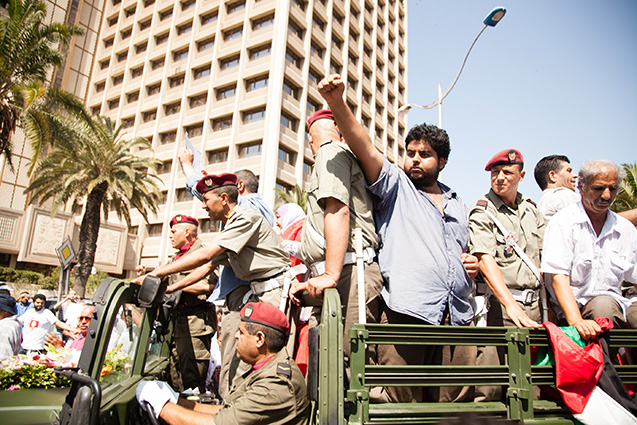
Ten thousand people protested outside Tunisia’s parliament in Tunis Monday in the seventh night of dissent after a high-profile political assassination sparked nationwide outrage toward the current moderate Islamist government.
“The people want the fall of the system,” shouted the crowd occupying Bardo Plaza, a traffic circle at the gates of the National Constituent Assembly (NCA). They were repeating last night the chant invented in Tunisia that became the slogan of the Arab Spring, heard from Tahrir Square to Damascus. Instead of targeting dictators like Zine El Abidine Ben Ali, Moammar Gaddafi and Hosni Mubarak, however, today the revolutionary phrase is aimed at Tunisia’s democratic government, headed by the moderate Islamist party Ennahdha.
“Muslim people will not surrender,” said a speaker from the pro-government counter-rally, a smaller crowd of 400 waving flags of Ennahdha and Salafi parties, on the other side of the zone militaire. Police in black looked on with their backs to a 400-foot-wide barbed-wire fence, as the Bardo protest reacted to the Islamists’ claim of religious primacy.
(Exact numbers of either side of the protest, like much information in Tunisia, remains elusive and hotly contested. Numbers used in this article reflect the reporter’s best efforts to assess media sources, eye-witness testimonies and his own experience.)
“We are all Muslims,” said an elderly lady, as the Bardo protesters began trying to drown out the religious claims of the Islamists with shouts of “God is great.” Waving Tunisia’s flag, close to 10,000 protesters swarmed over Bardo, leading some in the crowd and on social media to call it “Occupy Bardo.”
Human Rights Watch and the Tunisian news site Nawaat documented widespread police brutality on July 27, but the sheer numbers of protesters present at Bardo seemingly halted the practice. Security forces deployed undercover officers to infiltrate the crowd and pull out targets, and cyclically dispersed protesters with tear gas – termed “excessive use” by the state news agency.
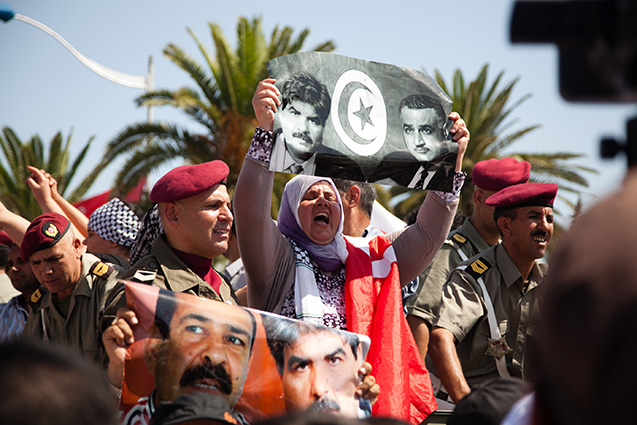 Mbarek Brahmi holds aloft an image of her late husband Mohamed Brahmi, 58, next to Gamel Abdul Nasser, both Arab nationalists allegedly slain by Islamists, during the massive funeral procession through Tunis, Tunisia on June 27, 2013.
Mbarek Brahmi holds aloft an image of her late husband Mohamed Brahmi, 58, next to Gamel Abdul Nasser, both Arab nationalists allegedly slain by Islamists, during the massive funeral procession through Tunis, Tunisia on June 27, 2013.
Legitimacy and Murder
Vocal opposition politicians argue Ennahdha has violated its term limits and lost its “legitimacy.” The Muslim Brotherhood-linked party won the 2011 election, but it now faces a crisis of domestic pressure, fearing the fate of its Egyptian brethren: a coup backed by massive popular unrest. Now the opposition is organizing successfully across the North African nation of 10 million, with rallies in most big cities.
“How did the government get this sharaia or legitimacy?” said Abdel Majid Belaid, brother of the leftist politician Chokri Belaid, assassinated earlier this year. “The people put Ennahdha in power, and now that they know Ennahdha has failed; they are demanding they leave power.”
Prime Minister Ali Laareyedh, from Ennahdha, gave a televised speech to the nation Monday night dismissing the protesters as “anarchists” and “opportunists.” He claimed Ennahdha has “a duty and a responsibility” to keep in power despite public mobilization.
“I feel like he was making fun of us,” said Imene Ounis, 21, as she scooped up garbage underneath barbed wire, dropping it into a bag held by Ashraf Fadhroua, 20. She’d been at Bardo since the first protest. “We are here for an idea; we are here for a fight. You have to change the mentality – it is your responsibility,” she said. “This place will be clean tomorrow.”
“After bloodshed, there is no legitimacy for the Ennahdha robbers,” chanted the protesters at Bardo. A sign read, “Legitimacy – Game Over.”
Tunisia’s latest protests started during the holy month of Ramadan, which began July 25, the national Day of the Republic, with the assassination of a nationalist opposition politician.
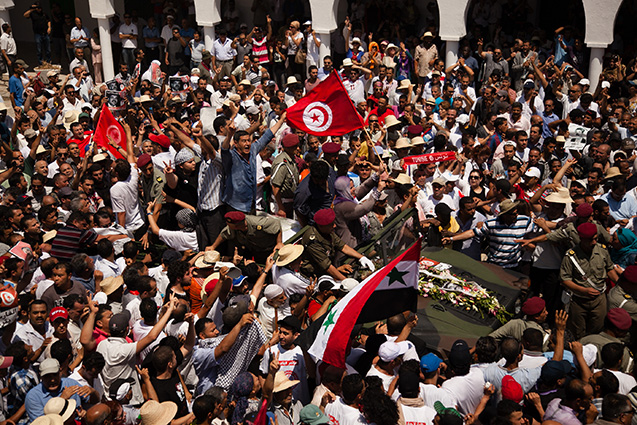 15,000 people attended the funeral procession of Mohamed Brahmi, 58, an assassinated nationalist politician, on June 27, 2013 through the city of Tunis.
15,000 people attended the funeral procession of Mohamed Brahmi, 58, an assassinated nationalist politician, on June 27, 2013 through the city of Tunis.
An elected member of the NCA, Mohamed Brahmi, 58, was a secularist, nationalist and vocal critic of Tunisia’s Islamist ruling party, Ennahdha. He’d argued, along with others in and out of the Popular Front opposition coalition, that while Ennahdha leaders had won the 2012 election, they’d overstayed their mandate. Tunisians had voted to give Ennahdha one year, ending on October 23, 2012, to produce a constitution. Brahmi and others had argued Ennahdha had failed and thus lost its legitimacy – the center-right Islamist party claimed it would have legitimacy until the constitution was finalized.
The debate has grown harsh. Two weeks ago on July 13, Ennahdhaoui politician Sahbi Atig said critics of the party’s legitimacy “will be trampled,” an act many now call an incitement to violence.
“Whoever dares to kill the will of the Tunisian people, like in Egypt, the Tunisian street will be allowed to do as it will, including shedding his blood,” Atig said at an Ennahdha press conference, defending the party’s legitimacy. Two weeks later, Brahmi lay in front of his house dying from 14 nine-mm bullet wounds, with his family as witnesses.
The news pushed thousands of Tunisians to the streets across the country.
In Sidi Bouzid, Brahmi’s hometown and the starting point of the Arab Spring, protesters continue to violently clash with police and block roads with fires. A man died during a protest in Gafsa, and protests are currently reported in Sousse, Sfax, Siliana, Monastir and Beja.
The first crowd in Bardo on Thursday, July 25, the day Brahmi died, was just 300. The next day, opposition protests on Avenue Habib Bourguiba, Tunis’ iconic thoroughfare, and at the national labor hall, counted fewer than a thousand attendees, while a pro-government rally of an estimated 300 started after the Friday prayer at the Al-Fath mosque, bused down to counter the Avenue Habib Bourguiba opposition protest, before also moving like their opponents to the NCA and Bardo.
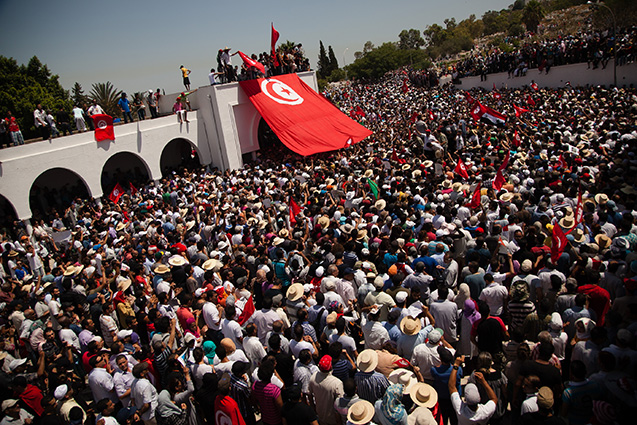 15,000 people attended the funeral procession of Mohamed Brahmi, 58, an assassinated nationalist politician, on June 27, 2013 through the city of Tunis.
15,000 people attended the funeral procession of Mohamed Brahmi, 58, an assassinated nationalist politician, on June 27, 2013 through the city of Tunis.
On Saturday, Brahmi’s funeral procession drew 20,000 people out into the streets, despite a morning car bomb explosion in the capital. An hour after the harmless detonation, medics delivered Brahmi’s body to his home in the northern suburb of Al Jazella. A military motorcade drove him, wrapped in Tunisia’s flag, to downtown Tunis, gathering people as it wound its way to the hilltop Al-Jallaz cemetery. Speakers, including Brahmi’s widow, Mbarka, demanded the dissolution of the government they feel has been hijacked by an antidemocratic Islamist – spurring the crowd to march straight from the funeral to Bardo and the NCA.
“After bloodshed, there is no legitimacy for the Ennahdha robbers – with our blood and souls, we will take revenge for you, oh martyr,” rang the chants of the crowd. “Ennahdha is stealing our country and killing our children – yes, we are going to die, but we will uproot Ennahdha from our land.”
Bardo quickly became chaos drenched in tear gas. The protesters clashed with members of the Committee to Protect the Revolution, a group of pro-government Islamist groups known for brutality, locally called millichiyat, or militias. Black-clad riot police with mechanized Humvees and armored vans separated the two groups with “excessive use of tear gas,” according to the state-run news agency, scattering crowds into the residential streets surrounding Bardo.
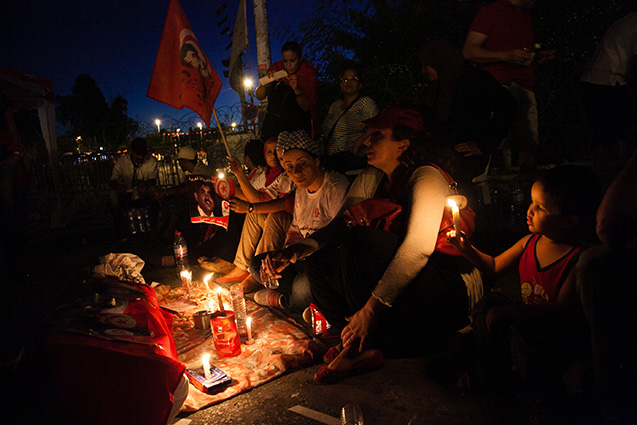 Protesters held a vigil for the recently murdered politician Mohamed Brahmi in Bardo Plaza, near Tunisia’s National Constituent Assembly, on June 30, 2013, where five nights of rallies have defied police brutality and tear gas.
Protesters held a vigil for the recently murdered politician Mohamed Brahmi in Bardo Plaza, near Tunisia’s National Constituent Assembly, on June 30, 2013, where five nights of rallies have defied police brutality and tear gas.
Some protesters and journalists hid out in sympathetic locals’ shops and homes during the larger raids of vans, batons and tear gas. Eye-witnesses accused the police of targeting protesters over the militias, and men in plain clothes fired tear gas launchers.
Estimates vary, but about 800 opposition and pro-government protesters returned later that night to occupy opposite sides of the plaza. The opposition forbade all party flags except for the national one; pro-government supporters waved Ennadha’s white flag and the black Salafi flag. With a zone militaire between, the rival rallies competed for volume until 3 AM, when police drove everyone home by blanketing Bardo with tear gas. The crowds returned in the morning to be chased off midday with tear gas – only to return again, each time picking up more people.
After sunset, 3,000 protesters returned to the Bardo Plaza on Sunday, threatening a sit-in until the government resigns and the NCA dissolves.
Reacting to this popular movement, 62 NCA members have resigned. If 73 total walk out, the 217-member parliament will collapse.
Streets are blocked off for miles around the plaza, yet coffee shops were open in the neighborhood; vendors sold Tunisian merguez sausage sandwiches and drinks; a few hookahs (water pipes) were available. A lone popcorn machine on a wheelbarrow crept through the crowd amidst old men selling Tunisian flags and scarves.
“May the people’s torturers fall,” some shouted. “May the Brotherhood party fall.”
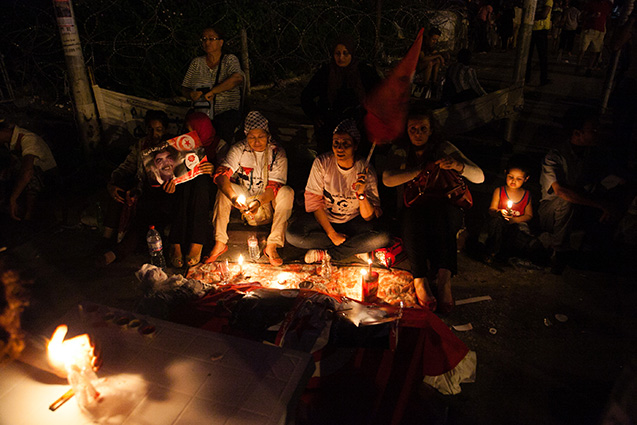 Protesters held a vigil for the recently murdered politician Mohamed Brahmi in Bardo Plaza, near Tunisia’s National Constituent Assembly, on June 30, 2013, where five nights of rallies have defied police brutality and tear gas.
Protesters held a vigil for the recently murdered politician Mohamed Brahmi in Bardo Plaza, near Tunisia’s National Constituent Assembly, on June 30, 2013, where five nights of rallies have defied police brutality and tear gas.
Bardo Now
On Monday evening, 10,000 people came to Bardo, despite the horrific news: A police van had hit a 20-year old boy in the morning’s tear gas purge, breaking his legs. The protest was small during the heat of the day, but after Tunis broke the Ramadan fast with a sunset iftar meal, the numbers grew quickly.
Rahma Bejaoui, 41, handed out donated water and food to anyone at Bardo. Loaves of French baguettes, pasta, chorbaor soup, bottles of olive oil, and brik, Tunisia’s triangular answer to the egg roll, graced her table. She’d sent food to police, the militias and pro-government supporters.
“They are Tunisian like us,” she said. “It is Ramadan, so we are trying to give everyone something to eat and some support. Tonight we’ve fed three to 400 people.”
The loose, volunteer-based center is recognizable to the other mass movements across the globe, from Zucotti Park to Gezi Park. Ounri, the volunteer garbage-picker, trades full bags for empty ones at the center, and Elias Sakeej, 13, delivers boxes of napkins and plastic dinnerware.
“People watching their televisions left their houses to come here; it’s marvelous,” Bejaoui said. “As long as it takes, we will be here.”
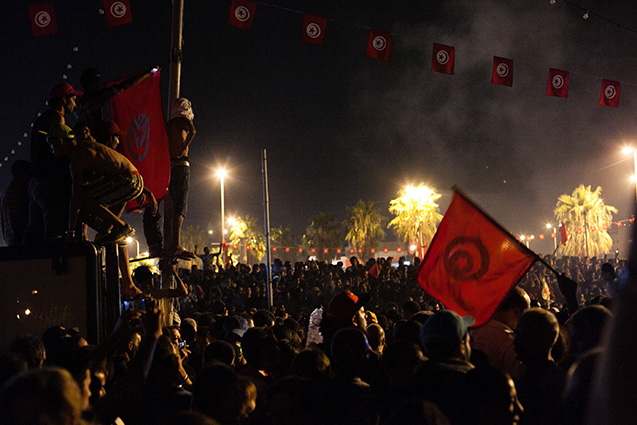 10,000 people rallied at Bardo Plaza near Tunisia’s National Constituent Assembly, on June 30, 2013, in the fifth night of protest since the brutal assassination of Mohmaed Brahmi, a nationalist politician, sparked nationwide protests.
10,000 people rallied at Bardo Plaza near Tunisia’s National Constituent Assembly, on June 30, 2013, in the fifth night of protest since the brutal assassination of Mohmaed Brahmi, a nationalist politician, sparked nationwide protests.
From 300 to a 10,000 people in five days, Occupy Bardo has rapidly gained strength. The pro-government rallies boast 800 people, at most, and are present in the evenings only.
“We are not going to leave here,” said Hamine Bouali, an 18-year-old high school student in a tent in front of the barbed wire. “The police are trying to destroy the protest, but we will not give up until the regime falls.”
In the dense crowd, Mohamed Markem, 26, carried a homemade mock coffin covered in poetry.
“Dogs sit in castles and drink cold water, while the lions in the streets go thirsty,” read one line.
“Ennahdha must go,” Markem said, coffin on his shoulders. “It is time for them to go.”
 10,000 people rallied at Bardo Plaza near Tunisia’s National Constituent Assembly, on June 30, 2013, in the fifth night of protest since the brutal assassination of Mohmaed Brahmi, a nationalist politician, sparked nationwide protests.
10,000 people rallied at Bardo Plaza near Tunisia’s National Constituent Assembly, on June 30, 2013, in the fifth night of protest since the brutal assassination of Mohmaed Brahmi, a nationalist politician, sparked nationwide protests.
Local TV stations estimated 30,000 people at the opposition rally in Bardo on Wednesday. Musicians and politicians sang songs on a large stage erected on the central fountain. Youth lit flares and ran through the crowd. Artists offered brushes and buckets of color for anyone wanting to paint on huge canvases hung around the square. Fireworks occasionally burst overhead.
The government remains steadfast, however. While it would negotiate, Ennahdha’s leader Rached Ghannouchi said the NCA was a “red line” that could not be crossed, according toTunisia Live.
The crowd began chanting again, 33 months after the Jasmine Revolution and the start of the Arab Spring, for new leadership.
“Dégage, dégage, dégage,” they shouted, sweeping their hands in the air. “Get out, get out, get out.”
Bardo remained boisterous and loud and, for the moment, peaceful.
Our most important fundraising appeal of the year
December is the most critical time of year for Truthout, because our nonprofit news is funded almost entirely by individual donations from readers like you. So before you navigate away, we ask that you take just a second to support Truthout with a tax-deductible donation.
This year is a little different. We are up against a far-reaching, wide-scale attack on press freedom coming from the Trump administration. 2025 was a year of frightening censorship, news industry corporate consolidation, and worsening financial conditions for progressive nonprofits across the board.
We can only resist Trump’s agenda by cultivating a strong base of support. The right-wing mediasphere is funded comfortably by billionaire owners and venture capitalist philanthropists. At Truthout, we have you.
We’ve set an ambitious target for our year-end campaign — a goal of $205,000 to keep up our fight against authoritarianism in 2026. Please take a meaningful action in this fight: make a one-time or monthly donation to Truthout before December 31. If you have the means, please dig deep.